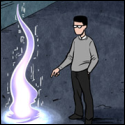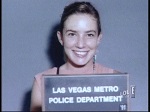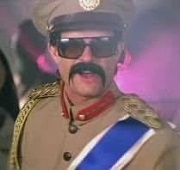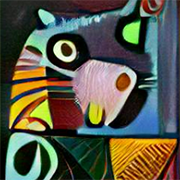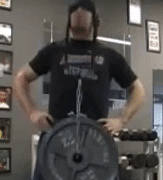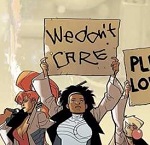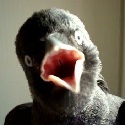|
What about social conventions like saying thanks, hello and bye? I could imagine going from barely recognising those to a complete turnaround where adults with autism are relying on them a little too much, appearing a little stiff and formal. Is it difficult for someone with autism to experience this, uh, brief closeness to someone else by following the above mentioned social conventions? Would you stick with it like it was a rule and if so do you feel irritated by all the people who may or may not follow those but are quick to offend when you don't? And last question, was there a moment where you recognised following along was better than to avoid it (like with eye-contact?)? Thanks.
|
|
|
|

|
| # ? Apr 20, 2024 02:37 |
|
lllllllllllllllllll posted:What about social conventions like saying thanks, hello and bye? I could imagine going from barely recognising those to a complete turnaround where adults with autism are relying on them a little too much, appearing a little stiff and formal. Is it difficult for someone with autism to experience this, uh, brief closeness to someone else by following the above mentioned social conventions? Would you stick with it like it was a rule and if so do you feel irritated by all the people who may or may not follow those but are quick to offend when you don't? And last question, was there a moment where you recognised following along was better than to avoid it (like with eye-contact?)? Thanks. Yet another adult-diagnosed autistic chiming in: I absolutely do get irritated when people ignore normal social conventions. I know it's completely irrational but some part of my brain is going "no, I learned this, that's not how you do it! Someone's going to yell at you for not being Normal(tm)!" Learning to follow along came around high school. Like someone said last page, being an academic overachiever (plus being born a girl; autistic trans club represent) meant a lot of people assumed I was just shy and bookish. Which I was, but that wasn't the only reason I had no friends. I did figure out the bridge of the nose trick quickly, which ironically made it harder to get diagnosed because psychs would always write down that I "maintained good eye contact". Leg-jiggling chat: my wife has the ADHD/autism/OCD trifecta and jiggles her leg constantly.
|
|
|
|
credburn posted:Something like fifteen years ago someone on this forum made an ask/tell thing about autism. I can't remember much of it, only thinking it was kind of interesting, and I remember there was that fellow whose online handle was something like ullululuul and he having autism. I could relate in a lot of ways to these two, except I wasn't autistic. Do you constantly find yourself arranging poo poo according to shape and size? Honest question. I know very little about autism.
|
|
|
|
That's something that young kids do. Not really an adult thing.
|
|
|
|
AngryRobotsInc posted:On the trans topic, an interesting tidbit, and one where no one is quite certain why, those who are transgender show a higher degree of autism spectrum disorders than you find in just a general slice of the population. This is a near decade-old study, but I vibe pretty hard with the term "gender incoherence". An interesting sidebar is the suggestion that autistic people tend to look younger than their age for likewise chemical reasons. I've seen autistic people saying they get mistaken for high schoolers or college students, but it's usually written off as a matter of behavior or clothing. I know me and my more autistic-seeming family members have plenty of stories of people thinking we're ten years younger than we are. Anyone else in that boat?
|
|
|
|
If I shave they start asking me for my ID at the liquor store, because of my babyface. If I don't then they don't.
|
|
|
|
Tjadeth posted:This is a near decade-old study, but I vibe pretty hard with the term "gender incoherence". Yeah, if not for male pattern balding, I look very young. People usually think I'm less than 30 and if I shave my head, I look like a college student.
|
|
|
|
After this thread fell over to the other page, I didn't know anyone had posted anything more.JetBlack posted:Do you constantly find yourself arranging poo poo according to shape and size? I (and I should think many autistic people) am constantly seeking to make sense of the world around me. It's not built for me, and is chaotic and in a constant state of moving and shifting in a way that is hard to contend with. I often feel like the new guy on a ship in a storm. The neurotypicals know how to shift their weight and can feel the pattern of the waves, but I'm just stumbling around looking for poo poo to hold on to so I don't topple over the side. I do often arrange things, sometimes without realizing it, but not necessarily to those specific metrics. I need to make order, and arranging things creates that order. My father has a very large record collection, and growing up I would frequently alphabetize them. My baseball card collection used to be grouped according to teams. I had all my blue-dominant pogs in one container and all my red-dominant pogs in another. I'm not obsessive about it, but it does reduce the anxiety if I see things placed according to some kind of system.
|
|
|
|
I was diagnosed autistic at 39 years of age and became obsessed with learning about it. I didn't recognize myself at all in the academic papers I read about autism, but it made a lot of sense when I started reading autistic people. Turns out non-autistic researchers were outside observers who were almost completely uninterested in asking their research objects about their perspectives. So then you get a lot of high-concept, impressive-sounding and low-quality research. Here are some resources by autistic people on autism, some of them are also academics: https://neuroclastic.com/ https://thepsychologist.bps.org.uk/volume-32/august-2019/me-and-monotropism-unified-theory-autism https://ballastexistenz.wordpress.com/2016/05/01/dont-ever-assume-autism-researchers-know-what-theyre-doing/ https://link.springer.com/content/pdf/10.1007%2F978-1-4614-6435-8_102273-1.pdf https://kar.kent.ac.uk/62639/1/Double%20empathy%20problem.pdf https://autisticadvocacy.org/about-asan/identity-first-language/
|
|
|
|
I kind of summarized my reading and thinking in this Autism is: 1. atypical cognitive development combined with 2. person/environment mismatch, which 3. leads to social and practical problems 4. that are not understood by the majority population 5. and consequently punished The social: When I see non-autistics interacting, it seems to me that they mostly interact through manipulating an imagined medium. Which I think of as "the social". I don't see or feel the social, I can only observe it indirectly. A highly developed sense of this social medium, and ability to manipulate it, is prototypical of "normal development". When autistic adults don't sense or manipulate it, this indicates to non-autistics that they're deficient in some way. I think I can pretend to sense and manipulate the social medium. But I don't think I can actually sense and manipulate it. It will be acting. I think this is an important disctinction, and an important reason why learning to act "normal" can be so harmful. This also helps to explain why eye contact be so uncomfortable. Without the social medium it's too intimate for most situations. I first started thinking about this when I noticed that groups of non-autistics would often kind of float from topic to topic like butterflies, just touching one thing and then fluttering away. It's incomprehensible to me. I thought this might be two things: 1. They score very low on monotropism, and don't get "stuck" on any/most topics. 2. They're not really talking about these topics, but instead co-operatively constructing and manipulating the "social" medium.
|
|
|
|
I'm probably going to regret posting in this thread, but is the aspie quiz relevant in this day and age? I've taken it about five times now and on average scored around 130. Part of me wants to dismiss it as skewed by design, but as some one who definitely has issues with anxiety, emotional control, and socializing its a bit concerning. To clarify I'm not trying to self diagnose, I just figure that if I ever work up the courage to go back to therapy, that it might be something worth mentioning.
|
|
|
|
I have no idea what the aspie quiz is or what that score means, but I did do some of those online autism tests in my late teens, and always ended up with borderline autistic scores. I ended up getting diagnosed years later, after a therapist who had a lot of experience with autistic people told me she wanted me to take a proper test. Take that as you will. I've been in cognitive groups that weren't specifically for autists, and ones that were. In my experience the specialized groups work a lot better. I'm also in trauma therapy right now, which is specialized to autistic people. If you ask me, there's value in getting a diagnosis. In my case it meant getting access to treatment that fits me much better. Dance Officer fucked around with this message at 23:53 on Jul 11, 2020 |
|
|
|
Anecdotally, when I first moved to this town I met this annoying girl at a poetry reading. She was sitting in front of me and she kept turning around and talking to me, and I kept thinking, geez this autistic girl is really awkward. A month later I went to another reading, met the same girl, and then established a friendship. A month later we began dating, and I told her that when I first met her I thought she was annoying and autistic, and to this she responded, "I'm not autistic. If anyone is autistic, you're autistic." This led to us, sort of jokingly taking an online autism quiz. We didn't take it seriously, however she did score very low on it while I scored very high. And three years later I was actually diagnosed with autism, and... honestly, I suspect she may be autistic, too, but it's not for me to really say. In any case, the online test was kind of accurate, at least regarding me. So, I say all this to say that online quizzes are not going to give you any real substantial readings, but the quirks it might reveal can lead you toward the things that can actually help. My insurance covered my neuropsychological evaluations, whether I had been diagnosed or not. Edit to say: I mention the insurance thing because while I don't remember what kind of insurance I had, it was pretty minimal at the time. Not to brag that I had insurance. credburn fucked around with this message at 00:42 on Jul 15, 2020 |
|
|
|
Tjadeth posted:This is a near decade-old study, but I vibe pretty hard with the term "gender incoherence". The only reason people accept how old I say I am now (mid-30s) is I started going gray. Even then I still get the "Really?"s.
|
|
|
|
credburn posted:Anecdotally, when I first moved to this town I met this annoying girl at a poetry reading. She was sitting in front of me and she kept turning around and talking to me, and I kept thinking, geez this autistic girl is really awkward. A month later I went to another reading, met the same girl, and then established a friendship. A month later we began dating, and I told her that when I first met her I thought she was annoying and autistic, and to this she responded, "I'm not autistic. If anyone is autistic, you're autistic." If you don't mind me asking what led you to seek out a diagnoses?
|
|
|
|
I was diagnosed as autistic at age 4. Early interventions - speech therapy, behavioral therapy, etc. definitely made me something of a normal human being.Speech therapy was super important. For me, there was no distinguishable difference between the words girl and grill at age ten, which kind of gives you an idea of how hosed up my speech is (and kinda still is). Behavorial therapy and a lot of fantastic mentors did the rest. I live a normal, functional adult life. A lot of that was simply growing to accept that I am who I am. I have zero qualms about being the autistic gently caress that I am, though I really tone it down to almost-normal-human-being at work. Plus, my IEP allowed me register first priority in college and fuuuuck me was that clutch.
|
|
|
|
Beard Dandruff posted:If you don't mind me asking what led you to seek out a diagnoses? For the same reason someone might get tested to see if they have a virus or something; so that I can figure out what to do with myself. I'd spent my entire life struggling to fit in, to get by, to understand people but it was all under the assumption that I there was nothing wrong with me except that I was "odd" or "weird" or, at times, exceptionally naive. Once I had my diagnosis, I was able to recontextualize my entire life. It turned thirty years of shame and guilt and regret into something almost the opposite... as a neurotypical person, I was just a really weird kid. As a person with autism, I was a kid who managed a never ending struggle. I've been in one form of therapy or another for almost ten years, and nothing really worked, but it's because all of this was under the framing of being neurotypical. Now I know I'm different, and that I need a kind of different tool set if I am going to get better. So, not that you asked, but I would tell anyone who is considering pursuing the venture toward a diagnosis that it is super beneficial. Did that answer your question? I feel like what I said is confusing, but I'm not sure how to better word it.
|
|
|
|
I want to pile in to say that I haven't had this shift in perspective. I still deal with the shame and the pain of rejection, and it really affects how I view the world, myself and other people to this day.
Dance Officer fucked around with this message at 15:41 on Jul 18, 2020 |
|
|
|
credburn posted:For the same reason someone might get tested to see if they have a virus or something; so that I can figure out what to do with myself. I'd spent my entire life struggling to fit in, to get by, to understand people but it was all under the assumption that I there was nothing wrong with me except that I was "odd" or "weird" or, at times, exceptionally naive. Once I had my diagnosis, I was able to recontextualize my entire life. It turned thirty years of shame and guilt and regret into something almost the opposite... as a neurotypical person, I was just a really weird kid. As a person with autism, I was a kid who managed a never ending struggle. It wasn't confusing in the least, and in some ways eerily relatable, thank you. A White Guy posted:I was diagnosed as autistic at age 4. Early interventions - speech therapy, behavioral therapy, etc. definitely made me something of a normal human being.Speech therapy was super important. For me, there was no distinguishable difference between the words girl and grill at age ten, which kind of gives you an idea of how hosed up my speech is (and kinda still is). Behavorial therapy and a lot of fantastic mentors did the rest. I live a normal, functional adult life. A lot of that was simply growing to accept that I am who I am. I have zero qualms about being the autistic gently caress that I am, though I really tone it down to almost-normal-human-being at work. The fact that I had to attend speech therapy as a child, and was diagnosed as having issues with auditory processing, is one of the main reasons I started to question if there's something up with me. For instance I distinctly remember that as a young child I was not able to tell the difference between the words spider and fire for some insane reason. Also I still have issues with verbal instructions. For instance if I'm verbally instructed to complete three or so basic tasks I'll often only succeed in carrying out the first task and will completely forget about the rest. Also I often find myself having to ask people to repeat themselves when they address me for the first time. I don't have hearing loss or anything, in fact my hearing is pretty sensitive and loud noises tend to bother me. Beard Dandruff fucked around with this message at 05:46 on Jul 21, 2020 |
|
|
|
This might just be coincidental, but I have a family member who is also autistic and as a kid he constantly struggled with differentiating a soft "a" sound with a long "o" sound. Like, instead of "park" he would say "pork" and not hear the difference. "Paul" and "pole," "ball" and "bowl," these were the same words to him, and he seemed unable to really vocalize the "a" sound at all until he was older. I'm not sure how common that is, or even if it is directly related to autism, though.
|
|
|
|
I'm a stay-at-home parent to a 2-year-old recently diagnosed with autism. We've been going to speech and OT for the past couple months after COVID lockdowns loosened a step and are starting some early preschool programs that will cover similar things. While he's still non-verbal in terms of explicit spoken language, we've been able to get him to imitate some sounds. (He's got great non-verbal communication, which might actually be hindering him learning to talk since he already has ways of getting his needs met in like 95% of cases due to his body language, gestures, and just grabbing us to directly get what he wants.) My favorite imitation right now is a wolf howl based on a sound he made that I copied/shifted toward the howl. It's super adorable because he grins after each time. I actually have millions of questions, but am not even sure where to start. So for the moment I'll just say that I'm glad I found this thread because I was tired of finding non-stop Pinterest Moms with YouTube channels that were nominally about their autistic kids, but actually just a way to leverage the kids into views and likes. Barf. whydirt fucked around with this message at 13:30 on Aug 14, 2020 |
|
|
|
Had my first conversations with two psychologists (one doing the interview and the other observing and taking notes) yesterday. A session alone and a follow-up including my wife. There's nothing clear at the moment but I think they are trying to figure out if my problems are a result of a attachment disorder / emotional neglect or ASD. Will have my next session in two weeks.
|
|
|
|
whydirt posted:I actually have millions of questions, but am not even sure where to start. So for the moment I'll just say that I'm glad I found this thread because I was tired of finding non-stop Pinterest Moms with YouTube channels that were nominally about their autistic kids, but actually just a way to leverage the kids into views and likes. Barf. Look for #actuallyautistic on social media platforms, it's used by (you guessed it) actually autistic people and not just Autism Moms. There are also some good groups on Facebook, just pay attention to whether a space is supposed to be autistic only or if allistic (not autistic) people trying to learn are welcome too. I've learned more about myself and living with the idiosyncrasies of autism from the autistic community than I ever did from psychologists/therapists, even ones who supposedly specialised in autistic people. Wrt the posters upthread talking about not being able to differentiate words and sounds... when I went through diagnosis the psychologist also did tests for dyslexia and apparently dyslexia is much broader and more diverse than just the "letters appear in the wrong order" stereotype that's commonly talked about. It's common in autistic people so I think what y'all are talking about might be an auditory form of it. I never had the verbal or reading mix-ups but the psych identified a deficit in my ability to process language.... if there's too much text or spoken word it can be like the words all pile up in my brain while I try to work out their meaning and if it's too much I'll start losing information. I read a lot when I was a kid but stopped as an adult and have always struggled with dry informational texts... I used to think I was just lazy compared to my friends who can read poo poo like old translations of Capital but I've realized I'm just not good at processing that kind of information and have to seek out more accessible forms.
|
|
|
|
What is your recommendation for toothpaste? Most have detergent, which does not taste very good.
|
|
|
|
I used to not brush with toothpaste at all (didn't like the mintiness), and it actually worked fine because I never ate sugary bullshit. When I started working out and eating to grow though my consumption of sugar went up and had to start using fluoridated toothpaste because I was starting to get cavities. I still don't like the taste but idk I just tolerate it. I only brush once a day though unless I have a date or something. There are a lot of good autism groups on Facebook that are more active than this thread and can probably give you better recommendations than me. Look for stuff in the group description or rules about "autistic people only".
|
|
|
|
I grew up with an autistic brother. His disability has had a huge impact on my life--it's a mix of good and bad. A lot of siblings end up in social service roles because of our experiences. I certainly did. It hasn't always been an easy road (things imploded when our mother died and I had to step in) though we're doing pretty well right now. I'm currently reading a really interesting book that might be up the alley of some folks here. It's about the difference between parental activism and self-advocacy for folks with disabilities. Pixelante fucked around with this message at 06:43 on Aug 31, 2020 |
|
|
|
Saerdna posted:I kind of summarized my reading and thinking in this Disclaimer: I have not been formally tested so obv. not diagnosed, but I have felt for a pretty long time that autism would explain an awful lot about me and how I experience the world. I've done several of the better online tests and I do score within the range. A basic thing is that I cannot tolerate prolonged eye-contact, it makes me feel sick and dizzy. Lots of other things too, but I don't think it every occurred to anyone that there might have been something going on with me because I was always highly verbal/communicative and pretty well-able to function in social settings, abeit in a very superficial way. What I wanted to say is that your description of other people perceiving a 'social medium' that you can't, but can partially infer the existence of by observing them, is extremely like a metaphor I came up with a while ago for how I perceive the same thing - it's like there is a constant melody, a global background music being played that they can hear and I can't. I sing along as best I can by copying the bits they sometimes unconsciously sing out loud, but it's fragmentary, and it's hard work. In conversations you feel like they all know when to move on to the next verse but you're left floundering and trying to adjust when it happens.
|
|
|
|
Just got diagnosed with Autism Spectrum Disorder. The psychologist who told me the result said he would describe me as an aspie if it was still an official diagnosis. I am not sure how I should feel about this as a 44 year old married grown rear end man. Self acceptance and a feeling of freedom as a result of that I guess.
|
|
|
|
Grats, I guess. Guess you'll have to learn the secret handshake.
|
|
|
|
Dance Officer posted:Grats, I guess.
|
|
|
|
Klaaz posted:Self acceptance and a feeling of freedom as a result of that I guess. This has actually been a huge thing for me, though the psychologist and therapists who were supposed to help me with this didn't do poo poo and I had to find autistic communities online to understand what being autistic even meant
|
|
|
|
Interesting thread. I wondered if any of could share some of your experiences on the process of being diagnosed (as an adult). What did it entail and how did it make you feel (not the diagnosis but the process itself). I am going through the process myself atm (at age 43) and the whole affair is making me very anxious. In my case the diagnosis consists of a series of talks with a psych. I know it is stupid but I am very afraid of doing it ‘wrong’, masking too much and inadvertently giving the wrong answers. Both my parents are long gone and the only info on my childhood are my own (very subjective) memories of it. (random example: when asked if am am structured or not, I tend to search for the few examples where I am rigid, but ignore the myriad of ways my life is super chaotic.)
|
|
|
|
Assuming your psych actually knows what they're doing, if you're autistic then you won't be able to successfully hide it from them. There are also cognitive tests that go along with the interviews, which can provide some objective evidence for the psych. When I went through testing I was told I scored significantly differently on different parts of the IQ test and that that was common with autism. I was also tested for dyslexia/dyscalculia/dysgraphia and ADHD as part of the testing, which often occur alongside autism
|
|
|
|
alcyon posted:Interesting thread. I wondered if any of could share some of your experiences on the process of being diagnosed (as an adult). What did it entail and how did it make you feel (not the diagnosis but the process itself). I was a little nervous throughout my diagnosis process because I was really conflicted about autism. On one hand, it's autism, and it's a hindrance, and it's weird and all the other negative baggage that comes with it. But on the other hand, if I were diagnosed with autism, it would reframe my entire life in a way that finally made sense. So I went in half really hoping for a diagnosis and half hoping against it. I was sure my conflicted feelings would muck the test up, and I found I tried to overcompensate in either direction, so as to not be too autistic, not too neurotypical. Anyway, after all that happened, I told the doctor about my conflict and he said it was very obvious what I was doing and not at all uncommon. So I guess I would say... like Turd says, if your psych knows what he's doing, he'll figure it out.
|
|
|
|
People on Twitter are discussing how the main character in Legally Blonde is autistic. https://twitter.com/FayeFahrenheit/status/1306310800794148865 Does that seem like a reasonable interpretation of the character?
|
|
|
|
I suppose there's some irony in autistic people doing character analysis. But no, I don't think it holds stake. Elle Woods steps into a world that's very different to the one she's been living in, experiences backlash because of it, and adapts and eventually succeeds. That doesn't make her autistic, that's what everyone experiences in the same situation. She also doesn't display any of the mannerisms and traits I normally associate with autism. Autistic people as a general rule don't strongly adhere to gender stereotypes, Elle plays them up. She doesn't stim. She doesn't suffer from the very significant changes in her life.
|
|
|
|
It's usually pointless to try to figure out if a fictional character is autistic. They are created by their writers, many of whom don't know much about autism. If the author intended their character to be autistic, usually it's either clearly specified or the character displays plenty of telltale signs. Otherwise the answer is no.
|
|
|
|
Gantolandon posted:It's usually pointless to try to figure out if a fictional character is autistic. They are created by their writers, many of whom don't know much about autism. If the author intended their character to be autistic, usually it's either clearly specified or the character displays plenty of telltale signs. Otherwise the answer is no. I'd say that depends-- death of the author and all that. Characters can display hallmarks of autism in ways that lead autistic people to identify with them while not being intended to be An Autistic Person by their author, largely because autism is so poorly understood by most. Sometimes authors aim for "quirky, interesting, slightly odd duck" and land firmly in "ambiguously autistic" territory, and sometimes it's hard to say exactly what the writers intended. Amelie is like that, it's not clear that the protagonist was explicitly supposed to be on the spectrum but her mannerisms and social sensitivities are really suggestive (and I definitely read her as autistic right away). I think it's safe to say Elle Woods wasn't intended to be autistic  But if some autistic people read in her the kind of all consuming masking they've experienced in their own lives, more power to them! But if some autistic people read in her the kind of all consuming masking they've experienced in their own lives, more power to them!
|
|
|
|
The problem with this is that a lot of symptoms that can be caused by autism can also be caused by other disorders/anxieties/traumas. There's a huge overlap in corresponding symptoms caused by all kinds of sources. Without speaking to the person in question and learning about his past and current day experiences you can never be sure. especially when you are not educated in this field of psychology.
|
|
|
|

|
| # ? Apr 20, 2024 02:37 |
|
WRT fictional autistic characters, I’m frankly embarrassed to admit it but the only one I’ve seen in vaguely current media that totally nails is is Entrapta, a character in the recent She-Ra cartoon. Apparently she’s specifically and consciously coded as autistic, and it’s a pretty good portrayal of it, without it being the only aspect of her personality or being made into either a ‘devil’ or ‘angel’- she’s a complex character with her own motivations.
|
|
|



